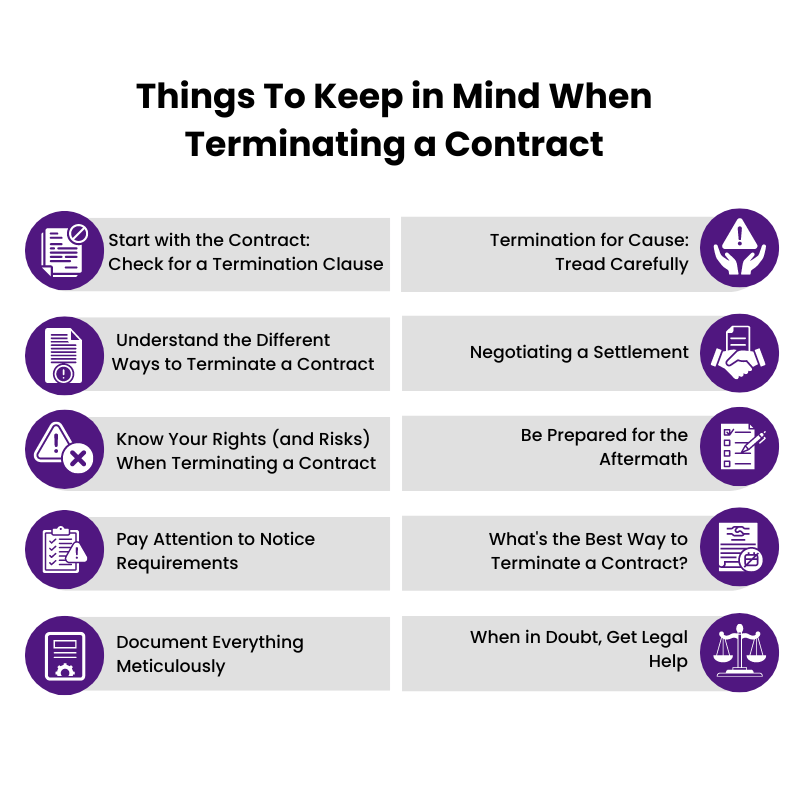“Can I just walk away from a contract?” “How do I know if I have grounds for termination of contract?” “What happens if the other party disagrees?”
These are common questions that arise when contracts go bad.
This blog post covers 10 essential things you need to know about terminating a contract, offering guidance for both individuals and businesses.
What is Contract Termination?
Put simply, contract termination is the process of legally ending a binding agreement before all parties have fully performed their obligations as stipulated in the contract.
There are several ways to terminate a contract, some specified within the contract itself and others provided by law.
Understanding how to terminate a contract and the legal grounds for doing so is crucial.
Things To Keep in Mind When Terminating a Contract

1. Start with the Contract: Check for a Termination Clause
Refer to the contract first. Many contracts include a specific termination clause that outlines the circumstances and procedures for ending a contract.
This clause is a roadmap for a smooth contract termination. It might specify:
- Valid grounds for termination
- Required notice periods
- Any necessary cure periods (time to fix problems before termination)
- Procedures for dispute resolution
2. Understand the Different Ways to Terminate a Contract
Even without a clear termination clause, there are several common ways to end a contract:
- Performance: When all parties fulfill their contractual obligations, the contract ceases naturally.
- Agreement: Parties may mutually agree to terminate a contract. This is most common for open-ended contracts without fixed terms.
- Breach of Contract: If one party significantly violates the contract’s terms, the other party might have grounds for termination. This is ‘termination for cause’.
- Impossibility: If circumstances beyond either party’s control make fulfilling the contract impossible, it might be terminated.
- Frustration of Purpose: If an unforeseen event fundamentally alters the basis on which the contract was formed, a court might allow termination.
3. Know Your Rights (and Risks) When Terminating a Contract
Ending a contract can have significant consequences. Ensure you fully understand your legal rights and the potential risks before proceeding.
Consider consulting an attorney, especially for high-value or complex contracts.
4. Pay Attention to Notice Requirements
Contracts often specify how much notice must be given before terminating a contract. This might be days, weeks, or even months.
Adhering to the notice period is vital to avoid being in breach yourself. If no period is stated, you must allow “reasonable” notice.
5. Document Everything Meticulously
Maintain a meticulous paper trail throughout the contract termination process. This includes:
- Communication: Written notices, emails, letters – keep copies!
- Contractual Evidence: Refer to the specific clauses or breaches supporting your termination.
- Evidence of Attempts to Resolve: Document any attempts to remedy the situation before termination.
6. Termination for Cause: Tread Carefully
Terminating a contract for cause – a breach on the other party’s part – is particularly risky. You must have rock-solid proof of the breach and must have followed the contract’s procedures to the letter.
An inaccurate claim of breach could expose you to liability.
[Related Post: Everything You Need to Know About Canceling a Contract]
7. Negotiating a Settlement
If a dispute arises, consider negotiating a settlement before resorting to legal action.
A termination agreement can formalize the end of the contract, address outstanding issues, and help avoid costly litigation.
8. Be Prepared for the Aftermath
Terminating a contract doesn’t necessarily mean the relationship is over. Consider:
- Survival Clauses: Some clauses survive termination of contract, such as confidentiality.
- Continuing Obligations: Severance packages or non-compete agreements might remain relevant.
- Damage Mitigation: You may be obligated to mitigate damages caused by the termination.
9. What’s the Best Way to Terminate a Contract?
There’s no singular ‘best way’ to terminate a contract, but there are some smart practices:
- Seek Professional Advice: Especially for complex situations, an attorney can protect your interests.
- Follow Contractual Procedures: Deviate at your own risk.
- Be Clear But Not Hostile: Your termination notice should be firm but professional.
- Aim for Clean Break: Try to address all issues in a way that allows both parties to move on.
10. When in Doubt, Get Legal Help
If you are unsure of your rights, the contract’s language, or the best way to proceed, consult an experienced contract law attorney.
The best time to think about contract termination is before you sign on the dotted line.
A well-drafted contract should include provisions for ending the agreement under specific circumstances. But even without perfect foresight, understanding the legal framework for terminating a contract will help you navigate difficult situations when they arise.




